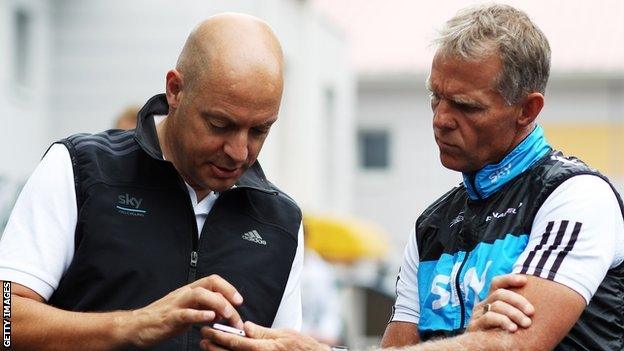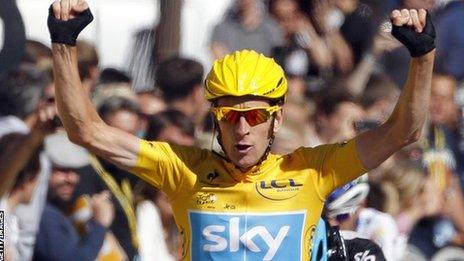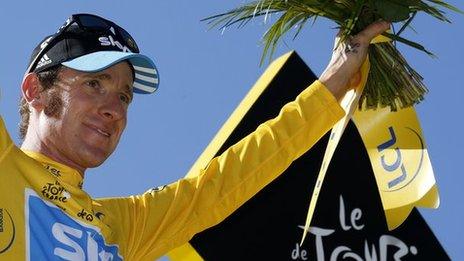Dave Brailsford sends British cycling Sky high
- Published

Dave Brailsford (left), organising Team Sky
Brailsford sends cycling Sky high
Team Sky think of everything. You name it, they're already doing it.
Their mechanics work in conditions that would put some surgeons to shame, laundry technicians make sure the riders get their own sheets in every hotel, and they even have somebody to go through the boring sections of computer games so the stars can start playing when they get interesting again.
OK, that last one isn't true. But there are rivals in the peloton who would not put it past Sky and their legendary quest for the "marginal gain".
They used to be mocked for this kind of thing - the "sky" blue stripe in the team toothpaste to match the stripe on their shirts and vehicles, the "thin line between success and failure" - but nobody is laughing anymore.
Of course, some in the sport are still too shocked by the shellacking Bradley Wiggins and Sky just gave them at the Tour de France to say much of anything, but most have acknowledged their respect for a plan that was beautifully conceived and ruthlessly delivered.
Hoy roars to sprint gold
And the man who came up with that plan is a softly spoken cycling obsessive from Caernarfon, North Wales called Dave Brailsford.
Coach, performance director, team principal, orchestra conductor… it is sometimes hard to pin down exactly what Brailsford does and does not do.
For most of the last three years, Brailsford has held down two full-time jobs: the first, his old gig as performance director of the all-conquering British Olympic team; and the second, a newer role as team principal of Team Sky, the all-conquering professional road racing outfit.
To understand how he has done this, you need to know a little bit about the renaissance of both British cycling and British Olympic sport.
Brailsford's story begins at the 1996 Olympics - best remembered for Michael Johnson's pyrotechnics on the track, bus drivers getting lost on the way to events and rampant commercialism, the Atlanta Games are not recalled with any great fondness in this country. GB finished 36th in the medal table with just one gold - Steve Redgrave and Matthew Pinsent in the the coxless pairs. It was a nadir.
Determined never to sink so low again, British Olympic sport looked abroad, restructured, and threw money at the problem in the shape of the National Lottery.
Suddenly, Team GB's "make do and mend" ethos was replaced with lots of money to spend on kit and coaches, but also an expectation that there would be some "return" on investment.
No sport took to this meritocratic accountability quicker than cycling. As Britain rose to 10th in the table at the 2000 Olympics, consolidated in 2004, and then burst through to finish fourth in 2008, it was cycling that led the way.
Cycling was fortunate in some regards in that the sport had just gained a facility in Manchester's National Cycling Centre, thanks to the 2002 Commonwealths, and that track cycling was a relatively low-hanging fruit in terms of global competition and the number of medals on offer, but nobody can underestimate the revolution that took place.
Radio 4's Profile of Dave Brailsford, British Cycling's performance director
So dominant was Brailsford's squad in Beijing - seven gold medals from nine events - that the sport's governing body rewrote the rules for London, scrapping events of British strength and limiting each country to one rider per event. There will be no all-British finals in London.
But Brailsford was lucky in another regard in that he built Beijing's golden haul on solid foundations. British cycling might have been a minor player on the world stage but it had enjoyed a few moments in lights, none more so than Chris Boardman's pursuit gold in 1992.
That success was a textbook case of a British athlete doing it in spite of the system. The key was Boardman's own ability and that of his coach, Peter Keen. Between them, they rewrote the book on how a cyclist should be delivered to the start line.
By the time the lottery cash started to flow, it was significant that Keen was in charge of the entire cycling programme.
Tour winner Wiggins' Olympic golds
When he moved to UK Sport, the agency that dishes out public money to Olympic sports, there was only one serious candidate to replace him.
What Keen started, Brailsford perfected.
Both men are sports scientists with a gift for organisation. They also love the sport in a way that perhaps only people who did not quite make it can love a sport. But Brailsford has a more relaxed, people-person kind of presence. It is these skills that have come to the fore since he decided the British track cycling success story needed a bigger stage.
Quite when this happened is the subject of much debate but at some point in the run-up to Beijing, the Derby-born strategist was already planning his next masterpiece, a British team competing in the Tour to the same high ethical standards he demanded from his track riders. And winning it, within five years.
When he voiced these ambitions publicly in 2009, the majority of his audience thought this was hubris but Brailsford knew there was a wave of talent coming through from the velodrome's endurance events, talent that was now being refined for the road at the academy he set up in Tuscany.
He had also correctly spotted that cycling as a sport was about to pop in the United Kingdom in terms of media interest and participation. Why else is Sky involved?
So while the gainsayers looked at the 2004 and 2005 Tours and saw no British riders, or pointed out that no Brit had done better than Robert Millar's fourth place in 1984, Brailsford smiled, confident he knew better because he had seen the data.
That first season, 2010, was by far the hardest. Brailsford would be the first to admit the team tried too hard to reinvent the wheel, which meant there was no shortage of critics waiting to flag up each disappointment - and Wiggins's 24th-place finish at the Tour was a disappointment.
But 2011 saw a humbler and wiser Team Sky turn up for races. Wiggins, who had been Brailsford's biggest gamble - a mega-bucks transfer coup in a sport that does not really do transfer coups - suddenly looked like the Tour contender only a few insiders had ever speculated he might become. Again, Brailsford was not surprised, he had seen the data.
Cavendish named 2011 Sport Personality after world road race win
Wiggins's painful exit from that summer's Tour would have derailed many teams at such a fragile moment in their development, but Brailsford and co took it in their stride.
Looking back now, that crash on the road to Chateauroux is probably the last real setback Brailsford and his team have faced.
Wiggins returned from injury and finished the season like a man destined for greatness, fellow Brit Chris Froome emerged from the shadows to underline his own Tour-winning potential and Mark Cavendish became the first British world champion on the road for 46 years.
Throughout all this, Brailsford's relaxed smile has remained constant. After all, he had seen the data.
In the interest of brevity, I will say nothing more about what we have all witnessed this season, except to say Team Sky's 2012 results are nothing short of domination.
Brailsford deserves the lion's share of credit for this transformation. He finished the work Keen started at the track team, had the vision to see how it could be recreated on the road, the charm to sell the idea to Sky, the knowledge to assemble a squad of world-beaters, the people skills to keep them all sweet and the guts to make tough calls when they needed to be made.
When all was said and done on Sunday, I grabbed Garmin-Sharp and Great Britain rider David Millar, who has jokingly referred to the Team Sky bus as the "Death Star", for a quick word about his occasional boss.
"Never mind Sir Bradley," I asked, "should we be talking about a Sir Dave, too?" "Well, knighthoods have been handed out for a lot less," Millar said. Indeed, they have. The only question is whether Brailsford could find time in his schedule to receive one.
- Published22 July 2012

- Published22 July 2012
